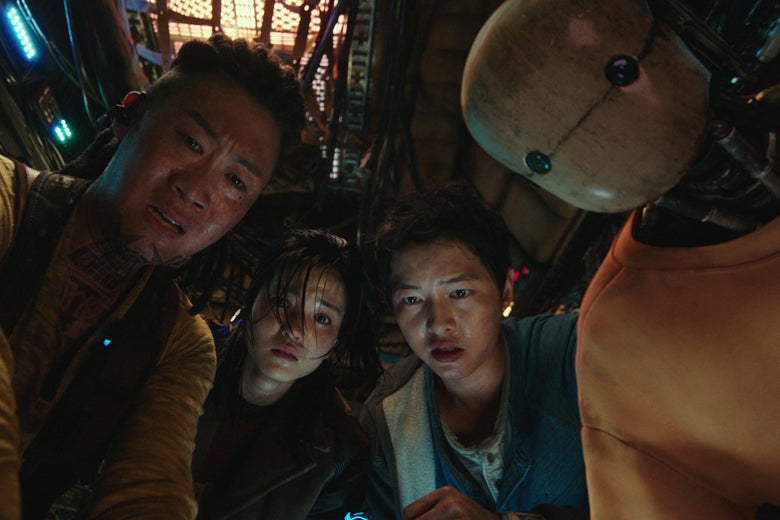
After a year with no new major blockbusters, Jo Sung-hee’s Space Sweepers arrives as a breath of fresh air. It’s not a perfect movie, nor a particularly innovative one, but the science-fiction adventure—touted as the first Korean space blockbuster—is certainly fun, with colorful performances and impressive CGI, and a worthy substitute for a new Star Wars or Marvel movie. However, its presence in a year of absences isn’t the only thing that makes it noteworthy.
Unlike nearly all of the movies from those two dominant franchises, Space Sweepers is led by people of color. The main characters are a crew of Koreans, and the film is one of the rare space operas that doesn’t posit that English has somehow become a universal language. There are chunks of English dialogue in the film, but the rival gangs our heroes encounter span a range of nationalities, from French to Brazilian to Chinese, and they all speak their own languages, after an early scene establishes that translation devices are so commonplace that everyone can understand each other without any issue.
Besides the eradication of the language barrier, however, the future seems bleak. In Space Sweepers’ version of 2092, Earth has become so polluted that it’s almost uninhabitable. The planet’s richest citizens, meanwhile, have escaped to Eden, a colony built by the megacorporation UTS and operated in Earth’s orbit. Roaming bands of “space sweepers”—essentially scavengers who collect and sell space junk—make their living in between the two. Tae-ho (Song Joong-ki), Captain Jang (Kim Tae-ri), Tiger Park (Jin Seon-kyu), and the robot Bubs (a CGI creation voiced by Yoo Hae-jin) make up one of many ragtag teams struggling to scrap together a living, but they find their fortunes changed when they discover a stowaway upon their ship. A young girl named Dorothy (Park Ye-rin), supposedly an android whose body houses a nuclear bomb, has been all over the news and is sought after by both UTS and a clan of terrorists known as the Black Foxes. Each member of the squad wants something that can only be bought with money—for example, Bubs wants a cosmetic upgrade to appear convincingly human—and so Dorothy’s arrival seems like it could be a windfall. However, as Dorothy, who for all intents and purposes is just a child, draws pictures of the group and endears herself to them, the idea of parting with her becomes more and more difficult to stomach.
The individual beats of the story aren’t particularly surprising—of course our heroes will all come to love Dorothy, and of course the menacing UTS CEO (Richard Armitage), a rich, white Englishman, isn’t as altruistic as he claims himself to be—but the multicultural nature of the movie’s world, which never feels belabored or self-congratulatory, goes a long way toward freshening up even the genre’s oldest clichés. Like Netflix’s other recent foreign imports—Lupin, Demon Slayer—it distinguishes itself through what it brings to the table that can’t be as easily found in most mainstream Western media. The fact that the characters are essentially cartoons similarly isn’t too much of a problem, given the inherently cartoonish nature of the story being told, and the actors are admirably game. Tiger Park is a stand-out—when Dorothy first calls him “Uncle,” his tough-guy demeanor almost instantly melts—and so is Bubs, a marvel of motion capture and also, ironically, one of the movie’s most fleshed-out characters. Bubs’ voice is male, but the “skins” Bubs longs to buy (i.e., the way the android wants to be perceived) are all female. That want is never portrayed as bizarre or even particularly notable in any way. It simply is, which, strange as it may sound, feels like one small step for transgender representation and, arguably, a giant one for blockbuster filmmaking from any nation.
When properties like Star Wars and Marvel are so homogenous that there are even Saturday Night Live sketches that bemoan the fact that there are apparently only four Black people in the whole galaxy, the mere existence of a film like Space Sweepers feels like an all-too-rare treat. That its cast is so delightful, and its special effects so impressive, is icing on the cake—especially during a time when the pandemic has resulted in a now nearly year-long famine when it comes to big-budget filmmaking. Amid the dystopian setting (the movie’s, and also our own), I couldn’t help but be charmed by its possibly naïve but hopeful idea that all of humanity might still come together to save itself. The fact that the film is climbing up the Netflix charts suggests that the rest of humanity might feel the same way.
Article From & Read More ( Korea’s First Space Blockbuster Just Premiered on Netflix. It’s a Blast. - Slate )https://ift.tt/3q5OQKV
Entertainment
Bagikan Berita Ini
















0 Response to "Korea’s First Space Blockbuster Just Premiered on Netflix. It’s a Blast. - Slate"
Post a Comment